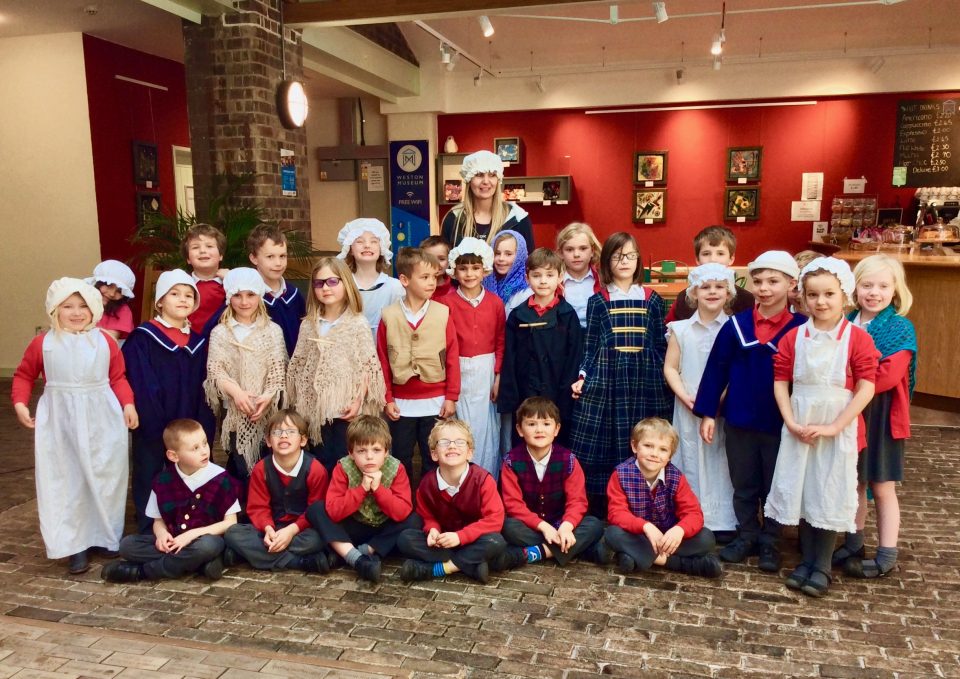Learning Sessions
Weston Museum prides itself on being a space for learning and offers a range of learning sessions and resources for schools, colleges, and community groups.
We have experienced children’s educators and a host of learning tools. We believe it’s all about a hands-on, interactive, and creative learning experience that can’t be found on a whiteboard or even a Victorian chalk one!
Click below for more information.

How We Support Schools
Take a trip to the museum to explore the displays and take part in an exciting learning session covering one of a range of history topics based around the National Curriculum.
Visit for a half-day or full-day, combined with lunch and maybe a trip to the seaside (within walking distance). The museum’s learning team can work with you to plan a visit and provide a wealth of knowledge and resources to make your history teaching outstanding!
Prices vary depending on times and class numbers, please get in touch to discuss your preferences with the Learning Team.
Bringing the Museum to the school or college
We offer in-school sessions in an adapted form, where members of the learning team will visit you. Popular curriculum topics are Victorian Seaside, The Iron Age and The Romans.
Learning Session Topics Covered
Fossils and Dinosaurs
Pretend to be a Palaeontologist by digging for the remains of the amazing creatures that once roamed the Earth. See how fossils are formed and create your own trace fossil to take away, then explore what we can tell about animals and dinosaurs from their fossilized teeth.
Stone Age to Bronze Age
Imagine how our ancestors survived in a place where mammoths and woolly rhinos roamed the land. Examine antler, bone, flint and bronze tools and have a go at fire lighting techniques. See how people were inspired by the animals around them by trying on furs and leather items, as well as trying your hand at some cave art by mixing pigments with vegetable fat.
This session is also available a whole class Cave Art activity, where we focus on animals and create some beautiful large scale works of art!
The Iron Age
Picture yourself as a tribal warrior by handling replica Iron Age swords, trying on some Iron Age dressing up and hearing about how a local hillfort came to a savage end. Learn about domestic life and how people made their clothing, as well as what items they treasured and wanted to take with them on their journey through life.
The Romans
Imagine yourself as a Roman emperor by trying on a toga, handling some replica Roman armour and making your own coins. Learn about Roman culture through playing some Roman games, designing your own mosaic and adopting a Roman name.
Saxons and Vikings
Uncover some Viking myths, play a Saxon game, then do some code-breaking by translating Viking runes. Map out Viking trade routes and handle some of their wares, then end the session with some giant map work to feel what it was like to battle for the heart of Britain!
Victorian Seaside
Explore the differences between Weston’s seaside now and its Victorian past. Dig in sand trays for beach objects and consider the differences between the natural and manmade objects to be found. Explore the history of puppetry and performance by dressing up as a familiar character or examine the different sea creatures found on our coastline and create your own seascape.
Victorian Life
Experience life as a Victorian child in Weston through dressing up and playing with some schoolyard toys that don’t require batteries. Consider some of the different chores and household tasks that Victorian home life demanded (including a whiff of carbolic soap!). Practice your hand-writing on slates and see what punishments would be used on fidgety school children!
Toys and Games
Enjoy a session of playing with toys and games from the distant to recent past. Consider what different materials old and new toys are made from and what powers them. Play with some Victorian schoolyard toys, explore puppetry and make your own stick puppet to play with. Then finish with a story all about museum toys!
Rubbish Archaeology
What does our waste say about us? To an Archaeologist, the things that have been put into the ground can be beneficial for learning more about the people that lived in the past. Discover and contrast the items left behind by previous generations with the possessions and waste we leave behind today, to enable discussion of climate change, plastic pollution and recycling.
